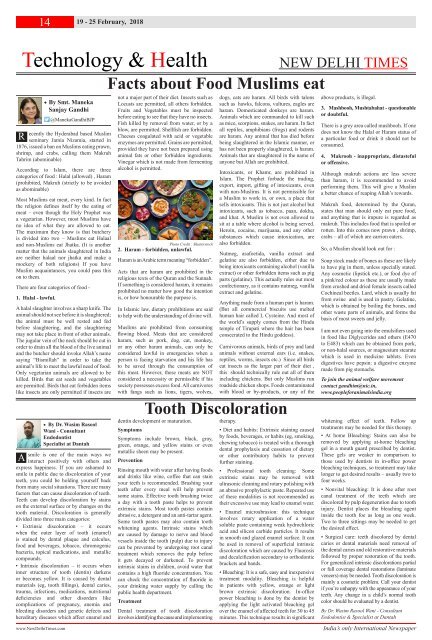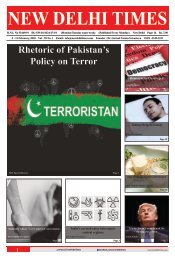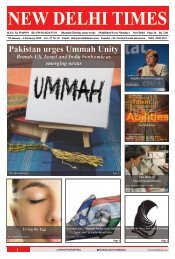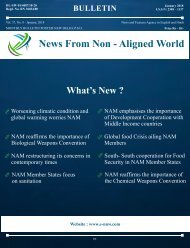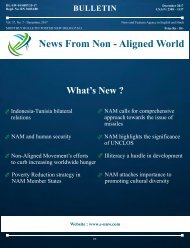19-25 February 2018 - 16 new-min
Create successful ePaper yourself
Turn your PDF publications into a flip-book with our unique Google optimized e-Paper software.
14<br />
<strong>19</strong> - <strong>25</strong> <strong>February</strong>, <strong>2018</strong><br />
R<br />
A<br />
Technology & Health<br />
www.NewDelhiTimes.com<br />
◆◆By Smt. Maneka<br />
Sanjay Gandhi<br />
@ManekaGandhiBJP<br />
ecently the Hyderabad based Muslim<br />
se<strong>min</strong>ary Jamia Nizamia, started in<br />
1876, issued a ban on Muslims eating prawn,<br />
shrimp, and crabs, calling them Makruh<br />
Tahrim (abo<strong>min</strong>able)<br />
According to Islam, there are three<br />
categories of food : Halal (allowed) , Haram<br />
(prohibited, Makruh (strictly to be avoided<br />
as abo<strong>min</strong>able)<br />
Most Muslims eat meat, every kind. In fact<br />
the religion defines itself by the eating of<br />
meat – even though the Holy Prophet was<br />
a vegetarian. However, most Muslims have<br />
no idea of what they are allowed to eat.<br />
The maximum they know is that butchery<br />
is divided into two – Muslims eat Halaal<br />
and non-Muslims eat Jhatka. (It is another<br />
matter that the animals slaughtered in India<br />
are neither halaal nor jhatka and make a<br />
mockery of both religions) If you have<br />
Muslim acquaintances, you could pass this<br />
on to them.<br />
There are four categories of food -<br />
1. Halal - lawful.<br />
A halal slaughter involves a sharp knife. The<br />
animal should not see before it is slaughtered;<br />
the animal must be well rested and fed<br />
before slaughtering, and the slaughtering<br />
may not take place in front of other animals.<br />
The jugular vein of the neck should be cut in<br />
order to drain all the blood of the live animal<br />
and the butcher should invoke Allah’s name<br />
saying “Bismillah” in order to take the<br />
animal’s life to meet the lawful need of food.<br />
Only vegetarian animals are allowed to be<br />
killed. Birds that eat seeds and vegetables<br />
are permitted. Birds that eat forbidden items<br />
like insects are only permitted if insects are<br />
◆◆<br />
By Dr. Wasim Rasool<br />
Wani - Consultant<br />
Endodontist<br />
Specialist at Dantah<br />
smile is one of the main ways we<br />
interact positively with others and<br />
express happiness. If you are ashamed to<br />
smile in public due to discoloration of your<br />
teeth, you could be holding yourself back<br />
from many social situations. There are many<br />
factors that can cause discoloration of teeth.<br />
Teeth can develop discoloration by stains<br />
on the external surface or by changes on the<br />
tooth material. Discoloration is generally<br />
divided into three main categories:<br />
• Extrinsic discoloration – it occurs<br />
when the outer layer of tooth (enamel)<br />
is stained by dental plaque and calculus,<br />
food and beverages, tobacco, chromogenic<br />
bacteria, topical medications, and metallic<br />
compounds.<br />
• Intrinsic discoloration – it occurs when<br />
inner structure of tooth (dentin) darkens<br />
or becomes yellow. It is caused by dental<br />
materials (eg, tooth fillings), dental caries,<br />
trauma, infections, medications, nutritional<br />
deficiencies and other disorders like<br />
complications of pregnancy, anemia and<br />
bleeding disorders and genetic defects and<br />
hereditary diseases which affect enamel and<br />
Facts about Food Muslims eat<br />
not a major part of their diet. Insects such as<br />
Locusts are permitted, all others forbidden.<br />
Fruits and Vegetables must be inspected<br />
before eating to see that they have no insects.<br />
Fish killed by removal from water, or by a<br />
blow, are permitted. Shellfish are forbidden.<br />
Cheeses coagulated with acid or vegetable<br />
enzymes are permitted. Grains are permitted,<br />
provided they have not been prepared using<br />
animal fats or other forbidden ingredients.<br />
Vinegar which is not made from fermenting<br />
alcohol is permitted.<br />
Photo Credit : Shutterstock<br />
2. Haram - forbidden, unlawful.<br />
Haram is an Arabic term meaning “forbidden”.<br />
Acts that are haram are prohibited in the<br />
religious texts of the Quran and the Sunnah.<br />
If something is considered haram, it remains<br />
prohibited no matter how good the intention<br />
is, or how honourable the purpose is.<br />
In Islamic law, dietary prohibitions are said<br />
to help with the understanding of divine will.<br />
Muslims are prohibited from consu<strong>min</strong>g<br />
flowing blood. Meats that are considered<br />
haram, such as pork, dog, cat, monkey,<br />
or any other haram animals, can only be<br />
considered lawful in emergencies when a<br />
person is facing starvation and his life has<br />
to be saved through the consumption of<br />
this meat. However, these meats are NOT<br />
considered a necessity or permissible if his<br />
society possesses excess food. All carnivores<br />
with fangs such as lions, tigers, wolves,<br />
dogs, cats are haram. All birds with talons<br />
such as hawks, falcons, vultures, eagles are<br />
haram. Domesticated donkeys are haram.<br />
Animals which are commanded to kill such<br />
as mice, scorpions, snakes, are haram. In fact<br />
all reptiles, amphibians (frogs) and rodents<br />
are haram. Any animal that has died before<br />
being slaughtered in the Islamic manner, or<br />
has not been properly slaughtered, is haram.<br />
Animals that are slaughtered in the name of<br />
anyone but Allah are prohibited.<br />
Intoxicants, or Khamr, are prohibited in<br />
Islam. The Prophet forbade the trading,<br />
export, import, gifting of intoxicants, even<br />
with non-Muslims. It is not permissible for<br />
a Muslim to work in, or own, a place that<br />
sells intoxicants. This is not just alcohol but<br />
intoxicants, such as tobacco, paan, dokha,<br />
and khat. A Muslim is not even allowed to<br />
sit at a table where alcohol is being served.<br />
Heroin, cocaine, marijuana, and any other<br />
substances which cause intoxication, are<br />
also forbidden.<br />
Nutmeg, asafoetida, vanilla extract and<br />
gelatine are also forbidden, either due to<br />
being intoxicants containing alcohol (vanilla<br />
extract) or other forbidden items such as pig<br />
parts (gelatine). This actually rules out most<br />
confectionary, as it contains nutmeg, vanilla<br />
extract and gelatine.<br />
Anything made from a human part is haram.<br />
(But all commercial biscuits use melted<br />
human hair called L Cysteine. And most of<br />
the world’s supply comes from the Hindu<br />
temple of Tirupati where the hair has been<br />
consecrated to the Hindu goddess).<br />
Carnivorous animals, birds of prey and land<br />
animals without external ears (i.e. snakes,<br />
reptiles, worms, insects etc.) Since all birds<br />
eat insects as the larger part of their diet ,<br />
this should technically rule out all of them<br />
including chickens. But only Muslims run<br />
roadside chicken shops. Foods conta<strong>min</strong>ated<br />
with blood or by-products, or any of the<br />
Tooth Discoloration<br />
dentin development or maturation.<br />
Symptoms<br />
Symptoms include brown, black, gray,<br />
green, orange, and yellow stains or even<br />
metallic sheen may be present.<br />
Prevention<br />
Rinsing mouth with water after having foods<br />
and drinks like wine, coffee that can stain<br />
your teeth is recommended. Brushing your<br />
teeth after every meal will help prevent<br />
some stains. Effective tooth brushing twice<br />
a day with a tooth paste helps to prevent<br />
extrinsic stains. Most tooth pastes contain<br />
abrasive, a detergent and an anti-tartar agent.<br />
Some tooth pastes may also contain tooth<br />
whitening agents. Intrinsic stains which<br />
are caused by damage to nerve and blood<br />
vessels inside the tooth (pulp) due to injury<br />
can be prevented by undergoing root canal<br />
treatment which removes the pulp before<br />
it gets decayed or darkened. To prevent<br />
intrinsic stains in children, avoid water that<br />
contains a high fluoride concentration. You<br />
can check the concentration of fluoride in<br />
your drinking water supply by calling the<br />
public health department.<br />
Treatment<br />
Dental treatment of tooth discoloration<br />
involves identifying the cause and implementing<br />
therapy.<br />
• Diet and habits: Extrinsic staining caused<br />
by foods, beverages, or habits (eg, smoking,<br />
chewing tobacco) is treated with a thorough<br />
dental prophylaxis and cessation of dietary<br />
or other contributory habits to prevent<br />
further staining.<br />
• Professional tooth cleaning: Some<br />
extrinsic stains may be removed with<br />
ultrasonic cleaning and rotary polishing with<br />
an abrasive prophylactic paste. Repeated use<br />
of these modalities is not recommended as<br />
their excessive use may lead to enamel wear.<br />
• Enamel microabrasion: this technique<br />
involves rotary application of a water<br />
soluble paste containing weak hydrochloric<br />
acid and silicon carbide particles. It results<br />
in smooth and glazed enamel surface. It can<br />
be used in removal of superficial intrinsic<br />
discoloration which are caused by Fluorosis<br />
and decalcification secondary to orthodontic<br />
brackets and bands.<br />
• Bleaching: It is a safe, easy and inexpensive<br />
treatment modality. Bleaching is helpful<br />
in patients with yellow, orange or light<br />
brown extrinsic discoloration. In-office<br />
power bleaching is done by the dentist by<br />
applying the light activated bleaching gel<br />
over the enamel of affected teeth for 30 to 45<br />
<strong>min</strong>utes. This technique results in significant<br />
NEW DELHI TIMES<br />
above products, is illegal.<br />
3. Mashbooh, Mushtabahat - questionable<br />
or doubtful.<br />
There is a grey area called mushbooh. If one<br />
does not know the Halal or Haram status of<br />
a particular food or drink it should not be<br />
consumed.<br />
4. Makrooh - inappropriate, distasteful<br />
or offensive.<br />
Although makruh actions are less severe<br />
than haram, it is recommended to avoid<br />
perfor<strong>min</strong>g them. This will give a Muslim<br />
a better chance of reaping Allah’s rewards.<br />
Makruh food, deter<strong>min</strong>ed by the Quran,<br />
states that man should only eat pure food,<br />
and anything that is impure is regarded as<br />
makruh. This includes food that is spoiled or<br />
rotten. Into this comes now prawn , shrimp,<br />
crabs – all of which are carrion eaters.<br />
So, a Muslim should look out for :<br />
Soup stock made of bones as these are likely<br />
to have pig in them, unless specially stated.<br />
Any cosmetic (lipstick etc.), or food dye of<br />
a pink/red colour as these are usually made<br />
from crushed and dried female insects called<br />
Cochineal beetles. Lard, which is usually fat<br />
from swine and is used in pastry. Gelatine,<br />
which is obtained by boiling the bones, and<br />
other waste parts of animals, and forms the<br />
basis of most sweets and jelly.<br />
I am not even going into the emulsifiers used<br />
in food like Diglycerides and others (E470<br />
to E483) which can be obtained from pork,<br />
or non-halal sources, or magnesium stearate<br />
which is used in medicine tablets. Even<br />
digestives have pepsin: a digestive enzyme<br />
made from pig stomachs.<br />
To join the animal welfare movement<br />
contact gandhim@nic.in,<br />
www.peopleforanimalsindia.org<br />
whitening effect of teeth. Follow up<br />
treatments may be needed for this therapy.<br />
• At home Bleaching: Stains can also be<br />
removed by applying at-home bleaching<br />
gel in a mouth guard prescribed by dentist.<br />
These gels are weaker in comparison to<br />
those used by dentists in in-office power<br />
bleaching techniques, so treatment may take<br />
longer to get desired results – usually two to<br />
four weeks.<br />
• Nonvital bleaching: It is done after root<br />
canal treatment of the teeth which are<br />
discolored by pulp degeneration due to tooth<br />
injury. Dentist places the bleaching agent<br />
inside the tooth foe as long as one week.<br />
Two to three sittings may be needed to get<br />
the desired effect.<br />
• Surgical care: teeth discolored by dental<br />
caries or dental materials need removal of<br />
the dental caries and old restorative materials<br />
followed by proper restoration of the tooth.<br />
For generalized intrinsic discolorations partial<br />
or full coverage dental restorations (la<strong>min</strong>ate<br />
veneers) may be needed. Tooth discoloration is<br />
mainly a cosmetic problem. Call your dentist<br />
if you’re unhappy with the appearance of your<br />
teeth. Any change in a child’s normal tooth<br />
color should be evaluated by a dentist.<br />
By Dr. Wasim Rasool Wani - Consultant<br />
Endodontist & Specialist at Dantah<br />
India’s only International Newspaper


